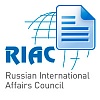Review 07.07.2014. First World War, European Political Landscape, Russian-Georgian Normalization, Sino-American geopolitical interests
In
Login if you are already registered
(no votes) |
(0 votes) |
Early July summer heat seems to have reached international affairs too. Everyone is either watching Mundial 2014 or relaxing at some spa beach resort. And yet the hectic world of IR is moving, experts are giving their opinion and politics is on the go. Here you will find publications on: a forever memory of the First World war beginning, changing European political landscape, Russian-Georgian normalization, Sino-American geopolitical interests and a book on Global Value exchange.
Let us remember that a century ago June saw the beginning of the WWI. This was a grand opening to the 21st century, which is universally acclaimed as bloody 100 years. What was so special about this war? And was there (is there) a plausible explanation of the countries' behavior that took lives of the innocent and weak and brought the world on the brink of a disaster? Here is a colorful and extensive essay on this troublesome topic by Prof. Anis Bajrektarevic from Sarajevo.
Moving Eastwards, we find an interesting piece on Russian-Georgian Normalization. Georgian Foundation for Strategic and International Studies gives a 100-page long report with different sections on how it should be done, what means and strategies should be applied. All spheres of our bilateral relations are there: from economic and social ties to common historical heritage. Two sections are dedicated to a thorough review of the EU role in the region.
Why doesn't Russia support China in the South China Sea? Jumping to the Asia Pacific Eastern region we come across this issue. Good question for those who breathe unevenly when geopolitics is brought up. Strategic and economic reasons keep Russia from doing so. Find out more by clicking the link. The Diplomat in Asia-Pacific gathers up facts and arguments to address the matter thoughtfully.
Digest Editor: Maria Gurova.
(no votes) |
(0 votes) |












